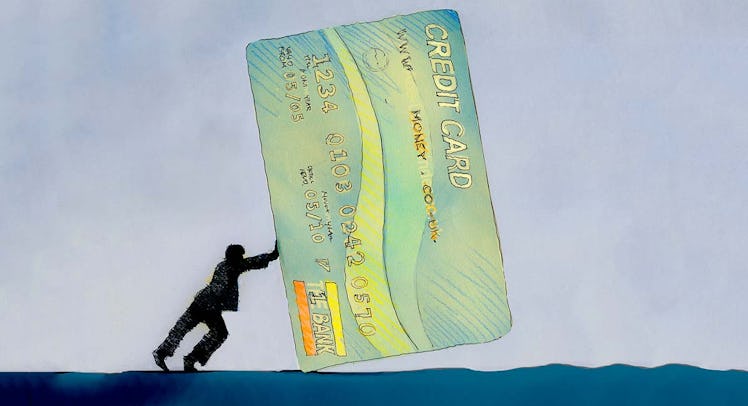9 Tips for Keeping Your Credit Score High
If you have some credit history (which includes making very few late or missed payments), you’re doing okay. But you can do better. Here’s how.

Few things are as integral to your financial life as a good credit score. That three-digit expression informs lenders that you’re in good financial standing and is essential for everything from renting an apartment to leasing a car to securing a good mortgage or interest rate. In short, it’s pretty important. And while you can still manage with sub-par credit, good credit enables you to side-step unnecessary costs and give you more leverage when negotiating big-time purchases. If you have some credit history (which includes making very few late or missed payments), you’re doing okay. But you can do better. Here’s how.
Spend Less Than 30 Percent of Your Available Credit
Creditors like when you spend their money because you’re going to pay a premium for it. But just because they gave it to you doesn’t mean you should spend it. In fact, spending more than a third of your credit makes you look dicey, and means it won’t be there if you really need it. “Don’t spend credit you don’t need,” advises Jeff Richardson, a credit expert with YourVantageScore.com.
Keep Credit Inquiries Within a Two-Week Period
Every time you or someone else makes an inquiry on your credit, it takes a slight toll on your score. “It’s statistically proven that people who are taking on new credit are risky,” Richardson says. This can come into play if you’re shopping for a new car and exploring a few payment options, as you should. Here’s the loophole: Inquiries made during a two-week period are counted as a single instance. For the smallest impact, start and finish the shopping and purchasing process in less than two weeks.
Know When To Close Old Accounts
It’s often best to keep old credit lines open, even if you haven’t used them since Monica Lewinsky was in the news, and you don’t intend to anytime soon. However, you might want to break that rule for accounts that have an annoyingly high annual fee, suggests Richardson. “Closing it will have an impact on your score. Over time that can be made up, though” he says. “If it doesn’t have much impact on your personal financial situation, keep it open and use it sparingly.”
Strive For Higher Than 700
“People think they have good credit and it’s 700, which is basically average” among American consumers, says Howard Cutler, a credit consultant. It might be enough to get by, but if you’re already doing that well, it shouldn’t take much more work to bump it up into baller territory.
Do As ‘High Achievers’ Do
The perfectionists whose credit score falls between 780 and 850 (the top score possible) are known as “high achievers” by FICO, the true credit power broker. Unless you have zero hobbies, you’ll never hit the 850 ceiling, but that’s ok, says Cutler. As long as you crack 780, you’ll be in the top tier, and eligible for the very best rates. “You want to get into the same basic behaviors as the FICO high achievers,” he says.
Here’s what separates them:
1. Never Miss a Payment (…Again)
“High achievers” have never missed a payment. Not one or two. None. So don’t ever miss one again. “Only 1 percent of these consumers have ever had a collection or public record of a bankruptcy, tax lien, or judgment.”
2. Have Three Credit Accounts. No More, No Less.
“According to FICO, the optimum number of credit cards for high achievers is three,” Cutler says. Even more specifically, the average age of those accounts is 11. That’s why closing accounts limits your credit history, one factor in your score. This is biased toward older people, but trying to hit this target average is a strong guiding principle. It means that every time you open a new credit account, your average credit-age drops. “Someone who’s 28 won’t have this, but you should strive for it.”
3. Five Percent is the Magic Number
Never use more than 5 percent of your available credit, Cutler says. “It doesn’t matter if you pay it off every month, the computers tracking this still track the percentage of your credit you’re using.” Five percent doesn’t sound like a lot. That’s because it isn’t. “There’s nothing wrong with using a debit card,” which aren’t tracked by credit reports, he says.
4. Don’t Even Apply for Credit Unless You Really Need It
Applying for credit makes your credit rating dip because it appears as if you could be overextending yourself. Among “high achievers”, their most recently opened credit line was created around two-and-a-half years ago. In sum, follow your high achieving role models. “Don’t open new lines,” Cutler says.
Keep these tips in mind and your financial life will seem a lot brighter.
This article was originally published on